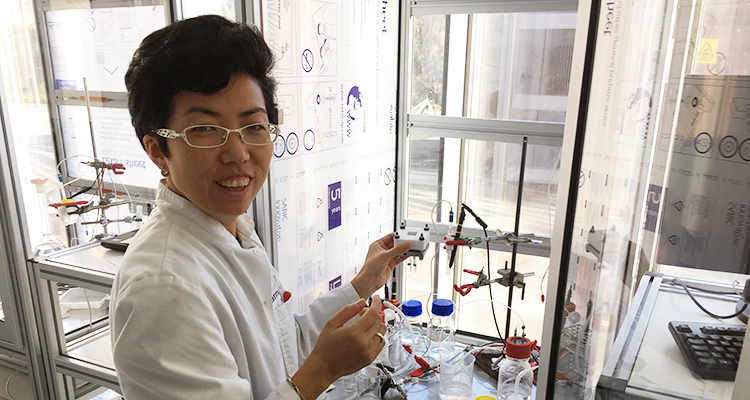
New invention could mean breakthrough for fuel cells
Researchers at SDU have patented an invention that recycles platinum. It could lead to a breakthrough for fuel cells and a new wave of green energy.
By Birgitte Dalgaard, bird@sdu.dk, 06-11-2017
There isn't enough platinum in the world to make the use of fuel cells widespread. It's as simple as that, says Associate Professor Shuang Ma Andersen from SDU Chemical Engineering.
Researchers from SDU Chemical Engineering have patented an environmentally friendly method of recycling up to 90% of the very precious metal platinum. In the long term, it could mean a commercial breakthrough for fuel cells.
- Fuel cells are essential if we are to reach the targets of 50% of Danish energy consumed being provided by sustainable energy by 2030 and 100% by 2050. If companies are expected to stop using oil in their machines, we need to offer them a reliable alternative. This is where fuel cells are a really good option, says Shuang Ma Andersen.
Fuel cells are a 'green' engine, which can run on hydrogen. So when there is no wind, fuel cells can produce electricity from stored hydrogen and in this way act as a stabilising factor in the energy system. Fuel cells are necessary in the efforts to change our world energy sources from fossil fuels such as coal, oil and gas to sustainable energy sources instead.
Platinum makes fuel cells expensive
The problem is that fuel cells are dependent on platinum as a catalyst in order for them to function optimally. But platinum is one of the world's rarest metals and its price could be more than double as much as gold. This means that fuel cells are nowhere near being a competitive alternative.
- So there are three options. Either increase the utilisation of platinum, recycle it or find an alternative, explains Shuang Ma Andersen and points out that the researchers are well on the way to developing a method of recycling platinum from fuel cells which is environmentally friendly, economical and effective.

Shuang Ma Andersen, SDU Chemical Engineering
- We have succeeded in developing environmentally friendly technology that allows us to reuse platinum from used fuel cells using an electrochemical method. The traditional method for recycling platinum involves poisonous chemicals or produces chemicals that are damaging to the environment. Our method leaves minimum footprint to the environment, says Shuang Ma Andersen.
Approved for a patent in the USA
After a long process, a patent has been approved for the method in the USA, and the researchers at SDU Chemical Engineering can now work on making the method more efficient and developing it to recycle platinum on a larger scale.
- Experiments have shown that the method can recycle up to 90% of platinum from fuel cells, but I expect we'll get up to nearer 100%, says Shuang Ma Andersen.
She explains that the energy group EWII has shown interest in the method because they can see a major business opportunity in recycling platinum and thereby making the price of fuel cells more competitive.
Fuel cells
A fuel cell is an engine which makes electricity for example from hydrogen. In the most chemically simple fuel cells, hydrogen and oxygen from the air are converted into electrical energy, thermal energy (normally waste energy) with steam as a byproduct. Many electric cars use fuel cells. It is thanks to fuel cells that the cars can drive for long distances.